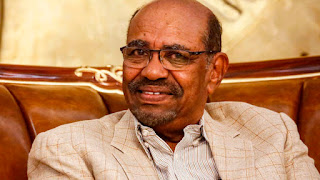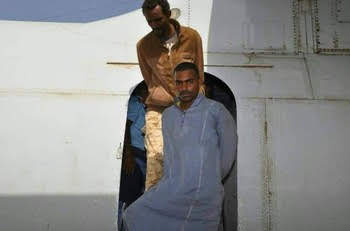NOTE from Sudan Watch Editor: I have just visited the archives of this site Sudan Watch 2004. The news headlines at that time seem to show we've gone full circle over past 20 years and are now back to square one. Here is an excerpt from one of the first reports reprinted here in 2004, followed by a recent report featuring the Arab tribal chief Mr Musa Hilal now aged 63.
Sudan Watch - Sunday, August 22, 2004
Janjaweed Leader Moussa Hilal - interview with UK Telegraph and IslamOnline.net
Aug 22: UK Telegraph news report by Philip Sherwell in Khartoum, copied here in full:
Tribal leader accused over Darfur says he was acting for government
The sheikh accused by the United States of co-ordinating Janjaweed militiamen has admitted that he was "appointed" by Sudan's government to recruit Arab tribesmen to "defend their land".
In an interview with The Telegraph, Musa Hilal scorned calls for his arrest on the eve of this week's visit to Sudan by Jack Straw, the Foreign Secretary, and the United Nations' deadline for Sudan to begin its promised crackdown on the Janjaweed.
"I don't care what my enemies say about me," he said, jabbing his finger. "I have no concerns about being arrested. I don't think the Sudanese government would be stupid enough to take that decision."
Mr Hilal has been identified by the US State Department as the most senior of seven Janjaweed leaders allegedly responsible for the ethnic cleansing conducted against predominantly black African villagers by Arab militiamen in the province of Darfur.
Mr Hilal, 43, a tall man who has three wives and 13 children and leads a tribe of more than 200,000 people, denies the accusation. He was not an "agent" of the government, he said, but acknowledged allegations that the Khartoum government was using the camel and horse-riding Arab militia to suppress the rebellion.
"I am one of the tribal leaders responsible for collecting people for military service for the country," he said, claiming that he organised his followers to defend themselves against Darfurian rebels.
"I was appointed by the government to organise people to defend their lands but legally, not illegally. They were defending themselves against the mutineers."
Read full story: https://sudanwatch.blogspot.com/2004/08/janjaweed-leader-moussa-hilal.html
Report from AlJazeera.com
By Mat Nashed
Dated 3 May 2023 - full copy:
Could an old tribal foe undercut Sudan’s Hemedti?
The RSF could be more vulnerable in its stronghold in Darfur, where a rival foe is challenging Hemedti.
PHOTO: Musa Hilal (centre right) celebrates with former President Omar al-Bashir (centre left) at the wedding of the former's daughter [File: Mohamed Nureldin Abdallah/Reuters]
After two weeks of armed conflict, Sudan’s feared paramilitary leader, Mohamed Hamdan “Hemedti” Dagalo, has fought the army to a deadlock in the capital of Khartoum.
But his Rapid Support Forces could be more vulnerable in their stronghold in Darfur, where a rival has challenged Hemedti for tribal supremacy, analysts and residents told Al Jazeera.
Enter Musa Hilal, a respected tribal chief from the same Arab Rizeigat tribe that Hemedti hails.
Back in 2003, Hilal fought on behalf of the government against mostly non-Arab armed groups, who were rebelling against what they said was the state’s neglect and exploitation of Darfur. According to Human Rights Watch, Hilal’s forces – the Popular Defence Forces, called “Janjaweed” by the rebels – were accused of committing summary executions and using rape as a weapon of war.
Between 2003 and 2009, about 300,000 people were killed in the armed conflict, as well as from disease and famine brought on by the war. But while Hilal was scorned worldwide, he was rewarded back home.
In 2005, Sudan’s former leader, Omar al-Bashir, put Hilal’s fighters under the army’s control and tasked them with protecting Sudan’s frontiers.
Three years later, al-Bashir appointed him as his special adviser and even awarded him a seat in parliament in 2010.
“The thing with these militia leaders is that they start off as proxies [for the central government] and then they end up having their own political ambitions,” said Hafiz Mohamad, a Sudanese researcher for Justice Africa, which advocates for human rights across the continent.
Despite Hilal’s ascension in Khartoum, he eventually returned to Darfur after growing frustrated at the government’s continuing neglect of the region.
The fallout prompted al-Bashir to turn to Hemedti – then a little-known trader and a former fighter – to command a new armed group called the RSF. One of Hemedti’s early tasks was arresting Hilal for refusing to disarm his forces.
Now, Hilal could look to settle scores by helping the army weaken the RSF.
“When Bashir created the RSF, he gave all sorts of resources to Hemedti. That’s really when this rivalry started. Hilal started a rebellion against the government and one of Hemedti’s first tasks was to contain him,” Mohamad said.
Mobilising forces?
In March 2021, Hilal was pardoned after spending six months in prison, before Hemedti and army commander Abdel Fattah al-Burhan – the two generals now fighting each other – upended the country’s democratic transition through a coup in October 2021.
Hilal has kept a low profile since his release, yet some analysts believed that the army has been trying to co-opt him – and fighters from his tribe – to undercut Hemedti.
“Hilal has been under Military Intelligence protection since his re-emergence,” one expert, who did not wish to disclose his name for fear of losing important sources and access to Sudan, told Al Jazeera.
Signs of a warm relationship between Hilal and the military have been reported. In June 2022, Hilal and his Revolutionary Awakening Council participated in peace talks with a number of other armed groups from Darfur, according to the latest United Nations Panel of Experts report on Darfur.
Sudan’s army sent the head of military intelligence, Major General Mohamed Ahmed Sabir, to mediate talks between the factions under the auspices of Promediation, a French NGO that assists mediation efforts between state and non-state groups.
The discussion centred around the peaceful return of Sudanese mercenaries, many of whom are loyal to Hilal, from Libya.
Months later, in the lead-up to the war between the army and RSF, Arab activists in Darfur reported that the military was recruiting from their clan in order to form a new border force that could undercut Hemedti.
The military has not denied that it was recruiting from Darfur, yet it did refute that it was coveting fighters from a certain tribe or clan. However, Hilal’s role and whereabouts remain uncertain.
“Rizeigat leaders were warning against an ongoing campaign to recruit fighters. The mobilisation is ongoing, but where Hilal fits in is not clear,” said Suliman Baldo, the founder of the Sudan Transparency and Policy Tracker, a think tank covering political affairs in the country.
“The fact that all these [Rizeigat] tribal leaders were complaining about [recruitment], shows that it was an intense activity,” he added.
From strongmen to politicians
While Hilal and Hemedti are both from the Rizeigat, they are from two different clans within it.
The former is from the Mahamid and the latter from the Mahariya.
But, similar to Hilal, Hemedti evolved from being a militia fighter to having his own political ambitions.
The difference is that while Hilal maintains a loyal following in North Darfur, Hemedti has been able to cultivate relationships with regional backers, such as the United Arab Emirates, Russia and Eritrea.
Those powerful friends give Hemedti and the RSF an outsized advantage against any attempt by Hilal to fight him, said Anette Hoffman, an expert on Sudan for the Clingendael Institute, an independent Dutch think tank.
“If there were no foreign players involved, Hilal would be able to mobilise through his tribal links, including whatever links he has in Chad,” she told Al Jazeera. “But with such powerful backers, Hilal just doesn’t compare any more to Hemedti.”
Despite Hilal’s disadvantages, Hoffman expected him to still try and mobilise fighters, which could make the fighting in Darfur significantly bloodier in the weeks and months to come.
“If we see Hemedti get killed at some point, then we could see a disintegration of the RSF and also of the Rizeigat as an ethnic group,” she said. “Hilal would then play a role that leads to more suffering and more fighting and access to arms. He would help to turn things uglier than they already are.”
For non-Arab communities in West Darfur, the scarier scenario is if Hilal and Hemedti put their differences aside in order to fight the army, said Zakaria Bedour, a local human rights monitor in the province.
She stressed that Mahamid militias and communities are already receiving support from the RSF in order to target non-Arabs in el-Geneina, the capital of West Darfur. The latest violence is due in part to a power vacuum in the region, prompting Arab militias to try and grab control over land and water resources.
The attacks have killed nearly 200 people, according to local doctors. Internally displaced camps sheltering non-Arab communities were also burned to the ground, while markets, hospitals and warehouses belonging to international relief organisations were looted.
“If [Hemedti and Hilal] get along, there will be consequences for the African tribes and the internally displaced people. [Hilal and Hemedti] remember the displaced people as being in opposition to them [in previous wars],” warned Zakaria.
“The consequence would make the [Arab] forces much bigger than the [armed non-Arab groups] in [West Darfur].”
Play Video - Duration 01 minutes 11 seconds
Video posted on social media documents destruction in Sudan
Play Video - Duration 01 minutes 13 seconds
Video shows destroyed Sudanese food market
KEEP READING
list of 4 items
list 1 of 4
What will the war in Sudan mean for Ethiopia?
list 2 of 4
UN refugee agency warns more than 800,000 may flee Sudan
list 3 of 4
Sudan fighting in its 18th day: A list of key events
list 4 of 4
View original: https://www.aljazeera.com/news/2023/5/3/could-an-old-tribal-foe-undercut-sudans-hemedti









